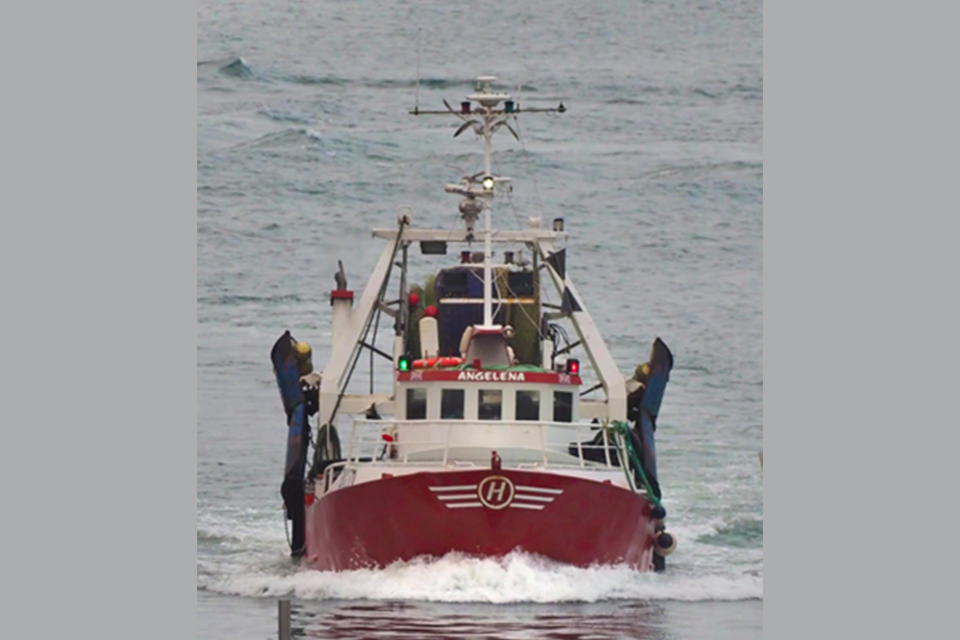Safety flyer to the fishing industry - Angelena
Published 1 August 2024
1. Summary
Capsize and foundering of the stern trawler Angelena (BM271) on 18 June 2021

Angelena - image courtesy of Alan Letcher
2. Narrative
At 1156 on 18 June 2021, the 11.82m stern trawler Angelena capsized and sank while its skipper was recovering the first catch of the day. A nearby vessel responded to the call between the coastguard and the Royal National Lifeboat Institution, and the unharmed skipper was rescued from Angelena’s liferaft around 40 minutes later. The skipper had been operating Angelena single-handedly for the second consecutive day due to crewing challenges. The fishing net’s cod end was full of sand, mud, starfish and fish and the excessive weight caused it to slew to starboard when it was lifted clear of the water.
Angelena was unable to recover from the starboard list and started to take water on deck, resulting in the vessel’s rapid capsize to starboard. The skipper, who had no time to raise the alarm before entering the water, was wearing a personal flotation device (PFD) fitted with a personal locator beacon and managed to both swim to and inflate Angelena’s liferaft, which had floated free. At 1206, and without a portable radio to hand, the skipper used their mobile telephone to raise the alarm. Unbeknown to the skipper, Angelena’s Emergency Position Indicating Radio Beacon (EPIRB) had also floated clear of the vessel and started to transmit.
3. Safety lessons
-
Angelena had undergone several modifications since build and the weights removed and added changed the vessel’s margins of stability. The skipper was unaware of the vessel’s potential stability issues as no stability assessments had been carried out.
-
Wolfson Guidance Freeboard Mark calculations and roll or heel tests can warn fishers of stability hazards. However, a full stability assessment is the only real means by which to quantify the limits of a vessel’s stability. Seek advice from local fishing vessel surveyors to understand what characteristics can affect stability.
-
Angelena capsized because it did not have sufficient reserves of stability to lift the contents of its net on board. The vessel was carrying insufficient fuel to counterbalance the destabilising forces created by lifting the excessive weight in the cod end from the high point over the stern.
-
Risk assessments reduce the severity and likelihood of a hazard and should consider factors such as the number of crew on board. The lone skipper was unable to simultaneously maintain a safe navigational watch and lift the catch efficiently; their options to recover from the foreseeable emergence of a difficult situation were limited.
-
It can sometimes be too dangerous to lift a catch on board. Ensure plans are in place to reduce hazards, including letting the catch go; no catch is worth the loss of someone’s life or livelihood.
-
Wearing a PFD and maintaining regular servicing of lifesaving equipment improves the chances of survival in the event of an accident. When a vessel starts to capsize it is too late to find out that lifesaving equipment is neither fit for purpose nor accessible.
-
Liferafts must be able to float free, inflate and break free automatically without human intervention. The effects of cold water shock or injury sustained during an accident can hinder completion of the simplest tasks and reduce survivability.
4. Further information
Our accident investigation report is available at: https://www.gov.uk/maib-reports/capsize-and-sinking-of-fishing-vessel-angelena.
Extract from The United Kingdom Merchant Shipping (Accident Reporting and Investigation) Regulations 2012 – Regulation 5:
The sole objective of the investigation of an accident under the Merchant Shipping (Accident Reporting and Investigation) Regulations 2012 shall be the prevention of future accidents through the ascertainment of its causes and circumstances. It shall not be the purpose of an such investigation to determine liability nor, except so far as is necessary to achieve its objective, to apportion blame.
Note:
This safety flyer is not written with litigation in mind and, pursuant to Regulation 14(14) of the Merchant Shipping (Accident Reporting and Investigation) Regulations 2012, shall be inadmissible in any judicial proceedings whose purpose, or one of whose purposes is to attribute or apportion liability or blame.
Image courtesy of Alan Letcher
Marine Accident Investigation Branch
First Floor, Spring Place
105 Commercial Road
Southampton
SO15 1GH
Email [email protected]
Enquiries during office hours +44 (0)23 8039 5500

